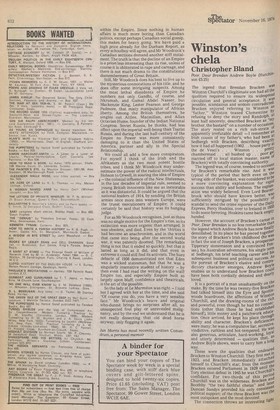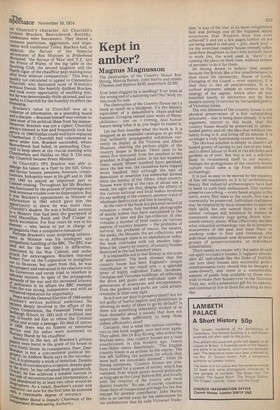Winston's chela
Christopher Bland
Poor, Dear Brendan Andrew Boyle (Hutchinson £5.25) The legend that Brendan Bracken was Winston Churchill's illegitimate son had all the qualities required to ensure its widespread circulation and general acceptance. It wa,s possible, scandalous and seldom contradicteo. Bracken enjoyed referring to Winston as "father," Winston teased Clementine bY refusing to deny the story and Randolph, at least half sincerely, described Bracken as "MY brother, the bastard" on a number of occasions; The story rested on a rich sub-strata 01 apparently irrefutable detail —I remember an Irish cousin of my father's, who had been at Sedbergh with Bracken, describing exactly how it had all happened (1902. .. house party at the de Vesci's . . . Winston . . . PrettYi chambermaid . . all hushed up . . poor ge, married off to local station master, name °I Bracken) with totally convincing authority. , The legend was, of course, needed to accoun' for Bracken's remarkable rise. And it Was typical of the period that birth even on the wrong side of the blanket, was considered to b. e a more convincing explanation for rapicl success than ability and boldness. The explan' ation was widely believed. Even Lord Beaver' brook who should have known better, wasf sufficiently intrigued by the possibilitY ° scandal to send the crime reporter of the DailY, Express, Percy Hoskins, over to Ireland in 1930 to do some ferreting. Hoskins came back eMPtY .handed. However, the account of Bracken's career itt Poor, Dear Brendan is no less remarkable than the legend which Andrew Boyle has now final's)! demolished. In its place he has pieced togethegr the story of Bracken's Irish childhood (he Wa° in fact the son of Joseph Bracken, a prosPerous Tipperary stonemason and a convinced Fenian), his Australian adventures, his single terM at Sedbergh, his brief teaching career and Ms subsequent business and political success. As the portrait of Bracken's elusive and contra' dictory character emerges, Andrew B°Y,Ide enables us to understand how Bracken cow loved. Itboth cordially detested and dearlY d. It is a portrait of a man unashamedly on the make. By the time he was twenty-five Brack.r had talked himself into the Eyre and spott''; woode boardroom, the affections of Winst°" Churchill, and the drawing-rooms of the rich and powerful, even though he had noconne°,; tions (other than those he had establishev himself), little money and a patchwork educt tion. Once arrived, he kept his place throll ability and character. Bracken's deficiencie' were many; he was a compulsive liar, secretn vindictive, ruthless and hot-tempered. He W91 also generous, articulate, hard-working, loYa, and utterly determined — qualities that, a' Andrew Boyle shows, were to carry him a long way. These were the qualities that endeare.d Bracken to Winston Churchill. They first MetTj 1923, and Bracken immediately attacklent himself to Churchill's star; from the Bracken entered Parliament in 1929 until Tory election defeat in 1945 he was Churchil confidant, For two-thirds of this Period Churchill was in the wilderness. Bracken al, Boothby "the two faithful chelas" and late' pDoul int ci caanl support; porf otvhi ed et r eh ei s Brackenonly s s t te tin; most outspoken and the most devoted. The connection throws an interesting hg" on Churchill's character, All Churchill's cronies, Bracken, Beaverbrook, Boo thby, Lindemann were buccaneers. They shared a c.ornmnn patriotism, aggression, and impatience with traditional Tories. Bracken had, in addition, the flavour of the financial adventurer, of Rex Mottram in Brideshead Revisited, -the flavour of 'Max' and `E.E.' and the Prince of Wales, of the big table in the Sporting Club, the second magnum and the fourth cigar, of the chauffeur kept waiting hour after hour without compunction." This was a quality not calculated to appeal to Clementine Ur chill, who distrusted most of Winston's Political friends. She heartily disliked Bracken and took every opportunity of snubbing him; but he was determinedly thick-skinned, and too Useful to Churchill for the hostility to affect the fnendship. Bracken's value to Churchill was as a collector of information, as a sounding board and a disciple — Bracken himself was content to ir.„tke most of his political ideas from his master. Wever, Bracken was not a cipher; Churchill always listened to him and frequently took his ,aelvice. In 1940 Halifax could well have replaced Lhamberlain if Churchill had volunteered to serve under him. Bracken succeeded, where Beaverbrook had failed, in persuading Churchill to keep silent at the crucial meeting with C. hamberlain and Halifax on May 9. The next elaY Churchill became Prime Minister. As Churchill's PPS Bracken was able to Indulge his talent as a fixer to the full. Grace and favour houses, pensions, honours, constituencies, bishoprics were in his gift and in 1940 and 1945 he played an important part in Cabinet-making. Throughout his life Bracken was fascinated by the process of patronage and took i
mmense trouble over its dispensation. But
Was Bracken's appointment as Minister of tilformation in 1941 which gave him the oPPortunity to show he was more than C. hurchill's shadow. He was a brilliant success In a Ministry that had been the graveyard o. f Lord Macmillan Reith and Duff Cooper in quick Succession. For four years he was in his element — who better to put in charge of Pro_Paganda than a compulsive romancer?
Perhaps Bracken's most surprising achieve
-nt as Minister was his intelligent and (Y111Pathetic handling of the BBC. The BBC was tab. d not for the last time) in difficulties, Mistrusted by the War Cabinet, and under attack for extravagance. Bracken imposed o Kobe.rt Foot on the Corporation to straighten Ut its finances; but apart from this, he was co,irellThspect and restrained in his relations with VGovernors and rarely tried to interfere in itoria! matters. In spite of the propaganda ,rlands of the war and the increased interest s'f Politicians in its affairs the BBC emerged Lo,in the war strong, independent and with an
anced reputation for impartiality.
/3 Peace and the General Election of 1945 ended 1,...acken's serious political ambitions. He /..7.„ able deeply involved in the affairs of the Chorporation, the Financial Times and rg School; by 1951 lack of political zest )/lf.tl, ill-health led him to refuse the Colonial in flee and accept a peerage. He died of cancer Set I958; there was no funeral or memorial irvIce and his ashes were scattered on 'c,nlneY Marsh by his chauffeur. pa-lecretive to the last, all Bracken's private Leer were burnt in the grate of his house in uNorth Street. In consequence, Root-, Dear grendrin is not a conventional political ImotioaPhy; as Andrew Boyle says in the introducthnn,' It is primarily a work of detection. Despite '-tcic of corroborative evidence, despite gaps Civ-e're”orY, he has refrained from guesswork. the he has achieved a notable success in task ask of reconstruction and interpretation, a bin abandoned by at least two other would-be en,'braPhers. As a result, Bracken's career and vv.itfacter can now for the first time be assessed ll. a reasonable degree of accuracy. /,r4"tstopher Bland is Deputy Chairman of the qaPendent Broadcasting Authority



































 Previous page
Previous page